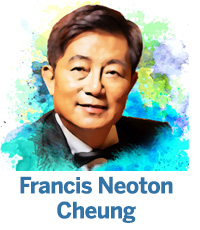Chief Executive John Lee Ka-chiu’s fourth Policy Address laid out an ambitious road map for the Hong Kong Special Administrative Region’s future. The blueprint, one of the most comprehensive in recent years, reflects the administration’s intent and determination to tackle long-standing problems while embracing new opportunities.
 The blueprint, which emerged from 40 consultation sessions, both online and offline, engaging a wide cross-section of society, puts forward a series of institutional reforms and strategic initiatives aimed at enhancing governance, boosting Hong Kong’s international competitiveness, and improving the quality of life of residents.
The blueprint, which emerged from 40 consultation sessions, both online and offline, engaging a wide cross-section of society, puts forward a series of institutional reforms and strategic initiatives aimed at enhancing governance, boosting Hong Kong’s international competitiveness, and improving the quality of life of residents.
Among the most notable proposals is the formation of new committees and task forces, including the Northern Metropolis Development Committee and its subgroups focused on operational models, university town planning, and project implementation. Other units — such as the Task Force on Supporting Mainland Enterprises in Going Global, the Task Force on Study in Hong Kong, the AI Efficacy Enhancement Team, and the Working Group on Ageing Society Strategies — signal a methodical, data-driven approach to policy execution.
As a member of the Chief Executive’s Policy Unit Expert Group, the author contributed ideas on long-term socioeconomic planning, digital integration, new urban renewal paradigms, and cross-boundary development strategies, including the “Twin-City Special Zone” concept integrating Hong Kong and Shenzhen.
While the report has drawn praise for its breadth, some critics argue that it lacks depth in certain areas. Yet policymaking is inherently pragmatic, requiring trade-offs between ambition and feasibility. “There is no best, only relatively better,” the author writes, underscoring the government’s balancing act between technical judgment and political reality, given the severe resource constraints.
‘Lion Rock Spirit’: A cultural compass
The “Lion Rock Spirit”, which reflects the “can-do” attitude of Hong Kong people and their collective determination to improve their lives in the face of difficulties, remains a potent symbol of Hong Kong’s resilience and unity. Rooted in the city’s postwar transformation, it embodies values such as diligence, perseverance, adaptability, and solidarity. Popularized by the 1970s RTHK drama Below the Lion Rock, its theme song continues to resonate with generations of Hong Kong residents. Lyrics like “Let go of divisions, pursue ideals together” and “Write immortal lines for Hong Kong with hard work” serve as timely reminders of the collective strength needed to overcome adversity.
This spirit is not merely nostalgic — it is a living ethos that can guide the city through its current challenges. Whether in economic recovery, social cohesion, or innovation, the Lion Rock Spirit offers a cultural compass for renewal.
In closing, the author calls for unity and perseverance: “Let us, with the Lion Rock Spirit and cha chaan teng synergy, continue to strive, adapt, and forge ahead — writing a new chapter of brilliance for Hong Kong”
‘Cha chaan teng’ synergy: A social microcosm
The cha chaan teng, Hong Kong’s iconic local diner, is more than a culinary institution — it is a metaphor for the city’s social fabric. On a recent visit, the author observed the tightly packed tables, diverse orders, and seamless coordination between staff and patrons. Despite the apparent chaos, there was order. The waiter, without pen or paper, memorized multiple orders and relayed them flawlessly to the kitchen.
This unspoken synergy — between diners and staff, among strangers sharing cramped spaces — reflects a deeper social contract. It is a testament to Hong Kong people’s ability to coexist, cooperate, and thrive under pressure. Such everyday interactions mirror the city’s broader ethos of mutual respect, efficiency, and adaptability.
Despite Hong Kong’s strong performance in various global rankings — talent competitiveness, innovation, higher education, and financial center status — many residents continue to struggle with livelihood issues. The disconnect between financial-market recovery and real-economy benefits has left many small and medium-sized enterprises and grassroots communities behind. Traditional industries face mounting pressure from regional integration and rising costs.
Mental health challenges are also on the rise. The author proposes a “333 Emergency Hotline” to provide immediate support for those in crisis. To be operated by the SAR government and linked to nongovernmental organizations, the hotline would offer professional assistance from social workers and medical teams.
Five pillars of future development
The 2025 Policy Address outlines five strategic directions: accelerating the Northern Metropolis development, advancing artificial intelligence industries, building an international education hub, fostering an inclusive society, and strengthening governance. These blueprints remain open to public input and refinement.
The author further suggests that local broadcasters produce a television drama inspired by the “Lion Rock Spirit” and “cha chaan teng synergy”. Such a series could galvanize civic pride and showcase Hong Kong’s unique values — respect for people, teamwork, diligence, creativity, and compassion — to a global audience.
In closing, the author calls for unity and perseverance: “Let us, with the Lion Rock Spirit and cha chaan teng synergy, continue to strive, adapt, and forge ahead — writing a new chapter of brilliance for Hong Kong.”
The author is chairman of Doctoral Exchange, a Hong Kong-based think tank.
The views do not necessarily reflect those of China Daily.


